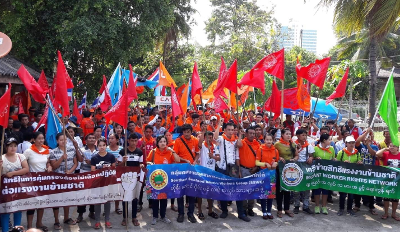
With a new report released today, the International Labor Rights Forum (ILRF) is calling on the Thai government, seafood companies, and global buyers to guarantee the right to freedom of association and collective bargaining for migrant workers in order to end pervasive forced labor in the Thai seafood industry.
“Affording migrant workers their internationally-recognized rights to freedom of association and collective bargaining is necessary to address the underlying causes of forced labor. These fundamental rights enable workers to correct power imbalances that allow exploitative employers and recruiters to hold workers captive and profit from their labor,” said Kimberly Rogovin, ILRF’s Senior Seafood Campaign Coordinator and the author of the report.
Time for a Sea Change: Why trade union rights for migrant workers are needed to prevent forced labor in the Thai seafood industry identifies key issues preventing migrant workers from addressing labor abuses themselves. Most important among these is the fact that migrant workers are legally barred from forming their own labor unions or serving as union leaders. In the seafood industry - where the majority of the workers are foreign migrants - the denial of these rights prevents most workers from negotiating for better wages and working conditions and seeking redress for violations. They also lack access to effective government complaint mechanisms and have been subject to defamation lawsuits when they report labor violations.
Thailand’s emergence as a leader in the global seafood industry generated a high demand for cheap labor in fishing and seafood processing activities, which could only be met by hundreds of thousands of migrant workers from neighboring Southeast Asian nations.
Working in commercial fishing and seafood processing is one of the most dangerous and exploitative professions worldwide. As documented in multiple exposés by investigative journalists and NGOs since 2014, human trafficking and forced labor of migrant workers in the Thai seafood industry is widespread.
Despite some reforms and measures by the Thai government, forced labor continues to be prevalent. The Seafood Working Group – a global coalition led by ILRF – recently documented serious labor rights abuses in the fishing and other sectors in 2019 and called on the U.S. State Department to downgrade Thailand in the Trafficking in Persons Report 2020. The latest research from the International Labour Organization shows a persistent forced labor problem, with 14% of fishers interviewed and 7% of seafood processing workers interviewed in situations of forced labor.
Thai companies and global buyers of fish and seafood products have also failed to respect workers’ fundamental rights, despite the obligation to do so under the UN Guiding Principles on Business and Human Rights. Seafood companies have refused to bargain collectively with representative groups of migrant workers formed in their establishments. Instead, workers are encouraged to join welfare committees which do not afford workers the same legal protection or result in enforceable agreements the way unions and collective bargaining do.
With the support of national unions, migrant worker organizations, global union federations and other actors, migrant workers in the Thai seafood industry have engaged in bold efforts to exercise their rights to freedom of association and collective bargaining. As profiled in the report, these include the Fishers’ Rights Network – a democratic, representative organization of 2,000 migrant fishermen working to improve wages and working conditions – and the Southern Seafood Workers’ Group – an organization of more than 200 workers across five seafood-processing factories.
Labor rights violations – including the violation of the right to freedom of association and collective bargaining – led the U.S. government to announce the suspension of $1.3 billion in trade preferences for Thailand in October 2019 under the Generalized System of Preferences (GSP) program.
“Thailand has jeopardized its trade relations with the United States and the European Union and its reputation in the global economy. Having had its preferential trade status under the U.S. GSP suspended, Thailand risks further losses to Thai business and the economy if it does not initiate meaningful reform, which must start with granting migrant workers the right to organize,” said Ms. Rogovin.

